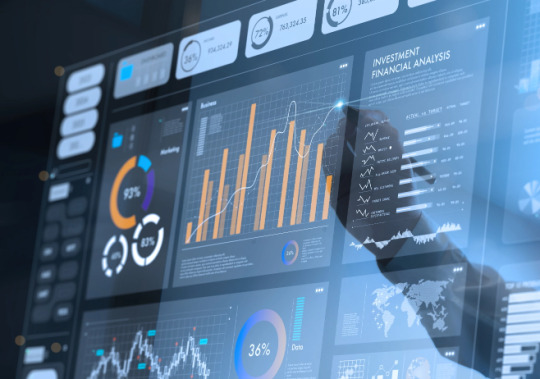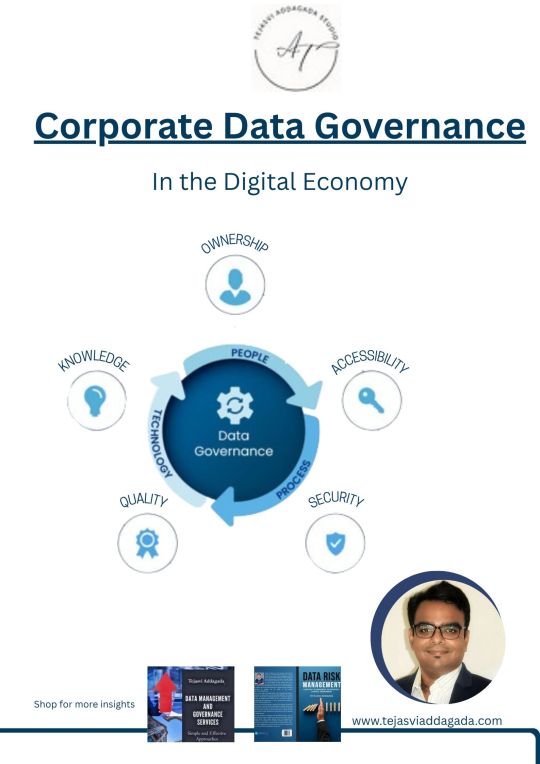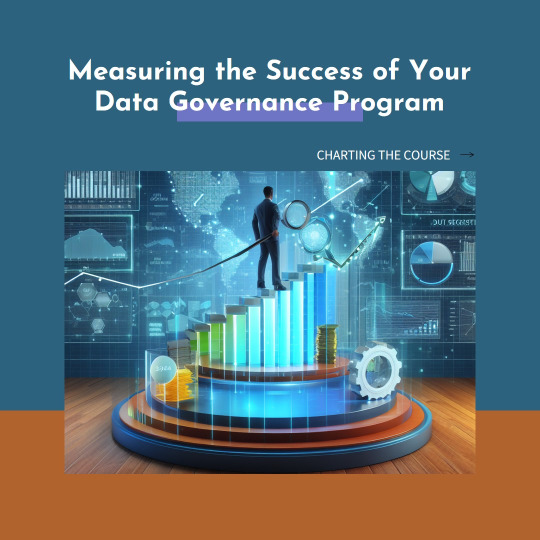#Data Governance Framework
Explore tagged Tumblr posts
Text
Master Data Governance Solution
A Master Data Governance (MDG) Solution provides a structured framework to ensure the accuracy, consistency, and accountability of master data across the enterprise. It establishes clear policies, roles, workflows, and controls for managing critical data entities such as customers, products, vendors, and assets. By enforcing data quality standards, validation rules

0 notes
Text

Data Management Framework for Business Success- Tejasvi Addagada
Tejasvi Addagada presents a robust Data Management Framework designed to drive business success. Learn how strategic data governance, quality control, and privacy enhancing technologies can boost efficiency, reduce risks, and support digital transformation. Discover best practices for implementing strong data structures that ensure reliability, compliance, and smarter decision-making in modern enterprises.
#tejasvi addagada#data management#Data Management Framework#data governance strategy#data risk management#Data Governance Framework
0 notes
Text
Simplify Compliance with Legal Tech | Data Governance & Risk Mitigation
Looking to protect your business from legal risks and data challenges? Data Nuance offers expert solutions in data governance frameworks, risk mitigation strategies, and online legal consultation. Our team helps you stay compliant with evolving data protection laws while providing reliable legal consultancy services for growing businesses. Whether you're managing digital data, ensuring regulatory compliance, or seeking smart legal support — we make it simple and efficient.
👉 Explore how Data Nuance can help your business stay protected: https://datanuance.in
#Data governance framework#Risk mitigation strategies#Online legal consultation#legal consultancy services#Data protection laws
1 note
·
View note
Text
Effective and Ineffective Data Governance Policies
Effective data governance policies play a crucial role in shaping overall data management practices within organizations. These policies establish frameworks that ensure data is handled consistently, securely, and in compliance with relevant regulations, ultimately enhancing the quality and utility of data across the organization. However, not all data governance policies are created equal.…
0 notes
Text
What is a Data Governance Framework and Why is it Critical? - PiLog Group
In the world of digital transformation, Data Governance Frameworks are at the heart of every successful organization’s data strategy. But what exactly are they, and why do they matter so much?
If you’ve ever wondered:
How can I ensure my organization’s data is accurate, secure, and compliant?
What steps should I take to implement a robust Data Governance Framework?
Why do businesses fail without proper data governance?
Then you’re not alone! These are questions many professionals grapple with. That’s why PiLog has addressed these critical topics in an insightful video, Watch Here:
youtube
Why Should You Watch This Video?
This video isn’t just another generic overview of data governance — it’s a comprehensive discussion packed with insights, expert advice, and actionable steps from PiLog, a global expert in data management and governance.
Here’s what you’ll gain by watching:
Understand Real-World Challenges: Learn about the key pain points organizations face in managing data.
Get Practical Tips: Discover actionable steps to build a scalable and effective Data Governance Framework.
Learn from Experts: Benefit from Dr. Imad Syed’s years of experience and expertise in data-driven transformation.
Watch the Full Video Here
What’s Inside the Video?
The video dives deep into:
The Basics of a Data Governance Framework: Breaking down the core components and their importance.
Critical Insights for Implementation: Step-by-step guidance on creating policies, assigning roles, and maintaining compliance.
Real-World Examples: See how leading organizations leverage governance frameworks to drive efficiency and growth.
Future Trends: A look at how data governance is evolving in the digital age.
But the real magic of this video lies in its exclusive insights you won’t find in a written article or blog.
Ready to transform how your organization handles data? Click Here to Watch the Full Video
Conclusion
A strong Data Governance Framework is essential for driving business success in today’s data-rich environment. But implementing one is easier said than done. PiLog Group simplifies this complex topic in an engaging, practical way in the video.

Don’t just read about it — experience it!
Watch the Full Video Here and take the first step toward mastering data governance.
#data governance framework#data governance#data security#data analytics#youtube#piloggroup#big data#data scientist#drimadsyed#datadriven#dataengineering#data#data analysis#Youtube
0 notes
Text
Data Governance Trends and Predictions: What to Expect in the Next Decade

Cybersecurity incidents can involve corporate espionage, fraudulent digital documents, or data leaks exposing employees and customers to identity theft threats. Therefore, no stakeholder will support a brand failing at essential data governance and standard compliance. Embracing those norms ensures companies can mitigate IT, accounting, and legal risks without problems. This post will highlight the data governance trends and predictions for the decade.
What is Data Governance?
Data governance encompasses legal, financial, and cybersecurity compliance to prevent unfavorable outcomes that threaten enterprise competitiveness, reputation, and trade freedoms. Its policy-related aspects involve macro considerations like consumers’ privacy rights or preventing tax evasion.
However, brands can also leverage data governance consulting to optimize in-house processes for micro-compliance aspects. For instance, they might define employee roles, data modification rights, network usage, and standard operating procedures. These activities facilitate an ease of encouraging accountability at the workplace.
Global organizations must explore how each geopolitical territory’s laws impact data governance requirements, compliance trends, and framework amendments. Otherwise, they will likely attract penalties for failing to change processes and meet local authorities’ expectations. Moreover, governance inconsistencies can alienate consumers in the target market based on controversial media coverage.
An agile data governance model develops cross-functional teams with a fixed member tally. On the other hand, an adaptive governance approach can systematically adjust operations based on new regulatory norms. Nevertheless, given the demand for federated data governance, innovations balancing democratization and authoritative hierarchies have gained momentum.
Top Data Governance Trends and Predictions Leaders Must Expect This Decade
1| Continuous Revisions to Governance Frameworks
A data governance framework relevant to a firm’s operations guides stakeholders in creating, managing, and modifying the right executive roles or bodies. You will find precise vocabulary in a framework to decide how to handle data events like major database leaks or accounting irregularities.
Furthermore, leaders can utilize data governance frameworks or DGFs to restrict the scope of collaborative data sharing with company outsiders. This strategy increases your enterprise’s resilience to corporate espionage and temporary workers misusing intelligence assets. As new compliance threats frequently undermine corporations, revising DGFs to optimize workflows is vital.
Finally, the recurring need to review the terminologies and role scopes arises due to ever-changing legal and political risks. More stakeholders and policymakers expect businesses to invest more in enterprise data security to protect consumer interests. Therefore, many nations regularly change and amend related IT laws.
At the same time, a global organization loses compliance ratings during the transition period after new regulations govern the business space. Managers prefer slight, incremental adjustments to governance policies instead of witnessing significant disruption because of occasional framework updates. These factors indicate all business-specific data governance frameworks must keep evolving.
2| Data Democratization for Decentralized Governance
Centralized governance models are time-consuming. After all, employees must invest remarkable time, effort, and resources to get approvals from the higher-ups on multiple levels. This approach also exhibits noticeable delays between requesting and securing file access permissions for minor database modifications.
Democratization principles describe a more agile or less restrictive attitude toward data access, update, and transfer. Empowering employees through a decentralized governance model also increases opportunities to foster self-learning, leadership, and collaborative innovation. Understandably, global businesses seeking to unlock the actual potential of multidisciplinary teamwork will embrace democratized or decentralized data governance models.
3| Ethical Implementation of Artificial Intelligence and Data Mining
Data ethics help managers avoid controversies concerning user privacy rights, historical biases, and cultural differences. Besides, it indirectly improves legal compliance. However, the global business community mainly wants to focus on ethical data operations to prevent the problematic use of artificial intelligence (AI).
AI-powered chatbots, software commands, and electronic devices promise a straightforward human-machine interface irrespective of an individual’s coding aptitude. Therefore, using AI to automate and experiment with data processing activities is theoretically harmless. Unfortunately, certain malicious actors can deliberately misconfigure or exploit AI systems to compromise a business’s IT systems.
Consider AI-generated reports and insights. Should an analyst accept the results of AI reporting tools without inspecting their reliability? No. Responsible, ethical implementation of AI and big data technologies is inseparable from most data governance trends. Companies recognize that. They will develop data quality assurance and moderation controls to overcome the challenges in AI integration.
4| Skill Crisis in Data Stewardship
Data governance frameworks and data quality management (DQM) tools will only be effective if skilled professionals lead the implementation efforts. An experienced data steward monitors data fitness and examines on-ground situations that a DGF or DQM strategy might cause.
Data stewardship requires technical, managerial, and legal skills to ensure harmony across a company’s data resources. As a result, data stewards must prevent discrepancies between branch offices’ records, master data, and analysts’ reports. They must collaborate with company lawyers, IT teams, and data governance officers (DGOs). Data stewards must excel at classifying datasets as regulated, restricted, or public.
On a related note, a subject matter expert or SME will require additional software and business administration skills to qualify for a data steward role. Remember, an SME’s recommendations are not obligatory. So, data stewards can employ a quality assurance criterion based on business priorities. Meanwhile, a subject matter expert might have domain expertise suitable for an advisory role instead of an executive one.
The skill crisis in the data stewardship space has forced many SMEs to tackle technological challenges beyond their capabilities. This situation signifies the urgent need to differentiate subject matter experts from data stewards. To become competent data stewards, they must undergo adequate training to acquire tech and law skills.
Conclusion
Data governance trends for this decade include frequent global and regional framework changes. In addition to a renewed emphasis on democratization, companies have evaluated their data operations from ethical perspectives. For instance, more stakeholders want hyper-enthusiastic users of AI-powered applications to integrate bias prevention and moderation policies.
Finally, skill gaps and job mismatches between SMEs and data stewards lead to workflow disruptions at many enterprises. Therefore, clarifying legal and tech qualification requirements during role assignments is essential.
When organizations embrace the right data governance frameworks and collaborate with talented data stewards or DGOs, they will witness extraordinary improvements in resilience.
1 note
·
View note
Text
The Data Governance Framework is a comprehensive structure designed to ensure the proper management, accessibility, quality, and security of an organization's data assets. It encompasses a set of principles, policies, procedures, and standards that guide how data is collected, stored, processed, and used. The framework aims to optimize the value of data while ensuring compliance with relevant regulations and mitigating risks associated with data handling.
#Data Governance Framework#Top Data Governance Framework#Top Data Governance Framework in 2024#enterprise data governance framework
0 notes
Text
Discover the pivotal role of data governance in DevOps evolution. Build stronger foundations for compliance, security, and efficiency.
#Data Governance Framework#Devops Environment#Devops Framework#Devops Methodologies#Devops-Driven Data Governance#Robust Data Governance#Software Development Consulting Company#Stage Of Product Development
0 notes
Text
Discover how robust data governance shapes DevOps evolution, ensuring secure foundations & compliance. Uncover insights now!
#Data Governance Framework#Devops Environment#Devops Framework#Devops Methodologies#Devops-Driven Data Governance#Robust Data Governance#Software Development Consulting Company#Stage Of Product Development
0 notes
Text
Discover how robust data governance shapes DevOps evolution, ensuring secure foundations & compliance. Uncover insights now!
#Data Governance Framework#Devops Environment#Devops Framework#Devops Methodologies#Devops-Driven Data Governance#Robust Data Governance#Software Development Consulting Company#Stage Of Product Development
0 notes
Text
Master Data Governance Solution

A Master Data Governance (MDG) Solution provides a structured framework to ensure the accuracy, consistency, and accountability of master data across the enterprise. It establishes clear policies, roles, workflows, and controls for managing critical data entities such as customers, products, vendors, and assets. By enforcing data quality standards, validation rules
0 notes
Text

Corporate Data Governance in the Digital Era- Tejasvi Addagada
Corporate Data Governance is vital in today’s digital economy. This blog explores how a strong data governance strategy, combined with data management services and frameworks, enhances data quality and security. Learn how businesses can navigate challenges using corporate data governance practices and implement AI-driven solutions like data quality generative AI to ensure compliance, integrity, and informed decision-making.
#tejasvi addagada#Corporate Data Governance#Data Governance Framework#Data governance strategy#data quality and security#data quality generative AI
0 notes
Text
youtube
What is a Data Governance Framework and Why is it Critical? – PiLog Group
In this insightful video, PiLog Group delves into the essence of a Data Governance Framework, emphasizing its pivotal role in today's data-driven business landscape. The discussion highlights how a structured framework ensures data accuracy, consistency, and security, which are essential for informed decision-making and regulatory compliance. Key takeaways include:
Understanding the core components of a Data Governance Framework.
The significance of data quality and integrity in business operations.
Strategies to implement effective data governance practices.
Real-world examples showcasing the impact of robust data governance.HatchWorks AI
1 note
·
View note
Text
Discover how robust data governance shapes DevOps evolution, ensuring secure foundations & compliance. Uncover insights now!
#Data Governance Framework#Devops Environment#Devops Framework#Devops Methodologies#Devops-Driven Data Governance#Robust Data Governance#Software Development Consulting Company#Stage Of Product Development
0 notes
Text
Key KPIs: Measuring the Success of Your Data Governance Program
A multi-faceted approach measures the implementation success of your data governance framework, empowering you to identify areas for improvement, optimise your program, and ultimately unlock the full potential of your data as a strategic asset. We recommend that you implement metrics based on the following categories: Business Impact KPIs: Often forgotten, these are the measures of how your data…

View On WordPress
0 notes
